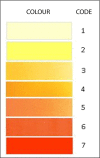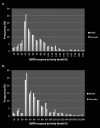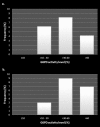Prevalence of G6PD deficiency in selected populations from two previously high malaria endemic areas of Sri Lanka
- PMID: 28152025
- PMCID: PMC5289554
- DOI: 10.1371/journal.pone.0171208
Prevalence of G6PD deficiency in selected populations from two previously high malaria endemic areas of Sri Lanka
Abstract
Glucose-6-Phosphate Dehydrogenase (G6PD) enzyme deficiency is known to offer protection against malaria and an increased selection of mutant genes in malaria endemic regions is expected. However, anti-malarial drugs such as primaquine can cause haemolytic anaemia in persons with G6PD deficiency. We studied the extent of G6PD deficiency in selected persons attending Teaching Hospitals of Anuradhapura and Kurunegala, two previously high malaria endemic districts in Sri Lanka. A total of 2059 filter-paper blood spots collected between November 2013 and June 2014 were analysed for phenotypic G6PD deficiency using the modified WST-8/1-methoxy PMS method. Each assay was conducted with a set of controls and the colour development assessed visually as well as with a microplate reader at OD450-630nm. Overall, 142/1018 (13.95%) and 83/1041 (7.97%) were G6PD deficient in Anuradhapura and Kurunegala districts respectively. The G6PD prevalence was significantly greater in Anuradhapura when compared to Kurunegala (P<0.0001). Surprisingly, females were equally affected as males in each district: 35/313 (11.18%) males and 107/705 (15.18%) females were affected in Anuradhapura (P = 0.089); 25/313 (7.99%) males and 58/728 (7.97%) females were affected in Kurunegala (P = 0.991). Prevalence was greater among females in Anuradhapura than in Kurunegala (P<0.05), while no such difference was observed between the males (P>0.05). Severe deficiency (<10% normal) was seen among 28/1018 (2.75%) in Anuradhapura (7 males; 21 females) and 17/1041 (1.63%) in Kurunegala (7 males; 10 females). Enzyme activity between 10-30% was observed among 114/1018 (11.20%; 28 males; 86 females) in Anuradhapura while it was 66/1041 (6.34%; 18 males; 48 females) in Kurunegala. Screening and educational programmes for G6PD deficiency are warranted in these high risk areas irrespective of gender for the prevention of disease states related to this condition.
Conflict of interest statement
The authors have declared that no competing interests exist.
Figures




Similar articles
-
Glucose-6-phosphate dehydrogenase deficiency prevalence and genetic variants in malaria endemic areas of Colombia.Malar J. 2016 May 26;15(1):291. doi: 10.1186/s12936-016-1343-1. Malar J. 2016. PMID: 27225440 Free PMC article.
-
Glucose-6-phosphate dehydrogenase deficiency among Yemeni children residing in malaria-endemic areas of Hodeidah governorate and evaluation of a rapid diagnostic test for its detection.Malar J. 2016 Jun 21;15:327. doi: 10.1186/s12936-016-1372-9. Malar J. 2016. PMID: 27329471 Free PMC article.
-
Prevalence of glucose-6-phosphate dehydrogenase (G6PD) deficiency in southeast Iran: implications for malaria elimination.J Infect Dev Ctries. 2015 Mar 15;9(3):289-97. doi: 10.3855/jidc.5572. J Infect Dev Ctries. 2015. PMID: 25771467
-
Glucose-6-phosphate dehydrogenase deficiency.Lancet. 2008 Jan 5;371(9606):64-74. doi: 10.1016/S0140-6736(08)60073-2. Lancet. 2008. PMID: 18177777 Review.
-
G6PD deficiency: a classic example of pharmacogenetics with on-going clinical implications.Br J Haematol. 2014 Feb;164(4):469-80. doi: 10.1111/bjh.12665. Epub 2013 Dec 28. Br J Haematol. 2014. PMID: 24372186 Free PMC article. Review.
Cited by
-
Prevalence of G6PD deficiency and distribution of its genetic variants among malaria-suspected patients visiting Metehara health centre, Eastern Ethiopia.Malar J. 2022 Sep 8;21(1):260. doi: 10.1186/s12936-022-04269-5. Malar J. 2022. PMID: 36076204 Free PMC article.
-
Acalypha indica induced acute oxidative haemolysis and methaemoglobinaemia: two case reports.J Med Case Rep. 2024 Mar 19;18(1):163. doi: 10.1186/s13256-024-04481-8. J Med Case Rep. 2024. PMID: 38500232 Free PMC article.
-
Plasmodium ovale infection in Sri Lanka: distant exposure and incidental detection of hyperparasitemia: a case report.J Med Case Rep. 2023 Dec 12;17(1):509. doi: 10.1186/s13256-023-04226-z. J Med Case Rep. 2023. PMID: 38082342 Free PMC article.
-
G6PDH as a key immunometabolic and redox trigger in arthropods.Front Physiol. 2023 Nov 17;14:1287090. doi: 10.3389/fphys.2023.1287090. eCollection 2023. Front Physiol. 2023. PMID: 38046951 Free PMC article. Review.
-
A vegetable-induced hemolytic crisis in a G6PD deficient person: a case report.BMC Res Notes. 2018 Mar 14;11(1):179. doi: 10.1186/s13104-018-3286-9. BMC Res Notes. 2018. PMID: 29540210 Free PMC article.
References
-
- Luzzatto L, Mehta A, Vulliamy T. Chapter 179: Glucose 6-Phosphate Dehydrogenase Deficiency. The Online Metabolic and Molecular Bases of Inherited Disease.
-
- Beutler E, Duparc S. G6PD Deficiency Working Group. Glucose-6-phosphate dehydrogenase deficiency and antimalarial drug development. American Journal of Tropical Medicine and Hygiene. 2007; 77: 779–789. - PubMed
MeSH terms
Substances
LinkOut - more resources
Full Text Sources
Other Literature Sources
Medical
Miscellaneous

